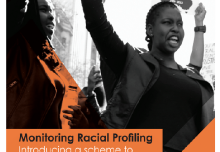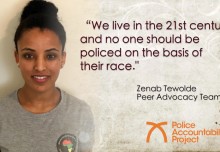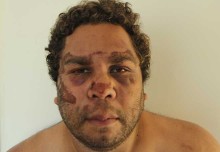We have been wanting to publish this speech for some time now. Ben Bowling, Professor of Criminology & Criminal Justice at King’s College in London, is an international expert on the policing of minority communities.
This speech, delivered in Flemington in 2012, covers the history of racial profiling and the humiliating and often discriminatory police practice of ‘stop and search’ in the United Kingdom and political changes that have taken place over recent decades.
The public forum was presented by Imara Advocacy, in conjunction with Monash University Criminology and the Flemington Kensington Community Legal Centre.
Stop, search and control: an historical perspective
 Black and brown people have been seen as ‘trouble’ for England and its rulers since the time of Queen Elizabeth I’s famous declaration that “all blackamores” should be “sent forth of the realme” (Fryer, 1984: 10-12). Throughout England’s history, migrant groups including Irish, European Jews, Roma and populations from Cyprus, Malta, the Indian Subcontinent, West Indies and Africa have been subjected to surveillance and control by the state because of their designated status as a “problem”. During times of repression, the undesirable have been defined or re-defined as “illegal”, excluded from entry and subjected to detention and deportation. And where they couldn’t be expelled, they have been subject to the exclusionary practices of police, chief among them stop and search.
Black and brown people have been seen as ‘trouble’ for England and its rulers since the time of Queen Elizabeth I’s famous declaration that “all blackamores” should be “sent forth of the realme” (Fryer, 1984: 10-12). Throughout England’s history, migrant groups including Irish, European Jews, Roma and populations from Cyprus, Malta, the Indian Subcontinent, West Indies and Africa have been subjected to surveillance and control by the state because of their designated status as a “problem”. During times of repression, the undesirable have been defined or re-defined as “illegal”, excluded from entry and subjected to detention and deportation. And where they couldn’t be expelled, they have been subject to the exclusionary practices of police, chief among them stop and search.
In early Tudor times, the administrative practice of ‘moving on’ the mobile poor before they could become settled in a parish exposed them to criminal punishment as vagrants (Rawlings, 2001). This included whipping, branding, ear-boring (literally ‘earmarking’), time in the stocks and even execution for repeat offences (Beier, 1985). By the 19th century, vagrants were considered to be in the wrong place not because they had strayed from their place of birth, but because they were deemed ‘idle and disorderly’ on the streets, instead of in the factories (Vagrancy Act 1824). Section 4 of this Act provided a power of arrest for a police officer encountering a person judged to be idle and disorderly, or suspected person or reputed thief, to be arrested and on conviction of being a rogue and a vagabond, subject to imprisonment in the house of correction for up to three months. This was the hated sus law that triggered the Brixton riots more than a century and a half later.
The 1981 riots: triggered by stop and search
Following the onset of mass migration from Britain’s former colonies, the newly arrived citizens and their families became the targets of policing. (Whitfield). In the 1960s The West Indian Standing Conference reported that police officers were going “nigger hunting… to bring in a coloured person at all costs’ (Hunte, 1966: 12). Allegations of oppressive policing against ’black’ and Asian communities – such as mass stop and search operations, the inappropriate use of paramilitary tactics, excessive surveillance, unjustified armed raids, police violence and deaths in custody recur throughout the 1970s and 1980s (Institute of Race Relations ,1987; Bowling and Phillips, 2002: 128-9).
‘… first ‘ethnically coded’ statistics painted a clear picture of disproportionality, a pattern that persists to this day.’
The increasingly strained relationship between black communities and the police collapsed vividly in the public disorder of Bristol in 1980 and then in Brixton in April 1981, followed by Manchester, Liverpool, Birmingham and other towns and cities in July (Solomos 1993: 154). The Brixton riots were triggered by ‘Operation Swamp ‘81’. For a week, 120 plain-clothes and uniformed police officers patrolled Brixton with specific instructions to stop and question anyone who looked ‘suspicious’. In all, 943 people were stopped over the course of four days. Of these 118 were arrested, more than half of whom were black. Among the 75 who were charged, only one was for robbery, one for attempted burglary and 18 for theft or attempted theft. People familiar with the experience of black Britain had predicted disorder for some years (see Pryce 1979). The images of riot, burning, looting and the threat of a ‘collapse of social order’ were brought home as scenes of pitched battles between police and people were beamed on to television screens across the country. In Brixton more than 300 people were injured, while many vehicles and 28 buildings were destroyed, some by fire.
After the abolition of ‘sus’, section 1 of the Police & Criminal Evidence Act 1984 authorised stop and search where police have ‘reasonable suspicion’ of wrongdoing. However, allegations that minority ethnic groups were being targeted persisted and the first ‘ethnically coded’ statistics painted a clear picture of disproportionality, a pattern that persists to this day.
The Lawrence Inquiry: one step forward, two steps back
The Lawrence Inquiry was faced in two directions on the issue of stop and search. It confirmed the sense that minority communities in England were “over policed and under-protected”, reached the view that it was used disproportionately and unfairly against black people. It recommended that all stops, not just searches, but all stops should be recorded. But it reached the un-evidenced conclusion that the power was essential for crime control.
In the immediate aftermath of the publication of the Macpherson Report, levels of recorded stop and search fell from what was then an all-time high in 1998 of around 1 million to around three quarters of a million in 2002. This reduction has many causes, but it was probably at least partly attributable to the criticism that the use of the power was frequently unlawful and unjustified. It was also argued by some police critics that officers were afraid of using the power against black people in case they were accused of racism.
However, police statistics show that while the number of stops of white people dropped very sharply, the numbers for black and Asian people fell to a much smaller extent. As a consequence, the racial disproportionality in the use of the power actually increased from a black/white ratio of 5 to 1 in 1999 to 8 to 1 in 2002, suggesting that black people are now more likely to be unfairly targeted than at the time of the Lawrence Inquiry. At the same time, as we discussed earlier, there is growing use of other powers, such as s.60 of the Criminal Justice and Public Order Act 1994, which are even more extensively used in ethnic minority communities.
Stop and search today
In the year ending April 2009, the police carried out about 4 million vehicle stops, 2 million stops and more than 1,140,000 searches. Of the people stopped and searched, 15% were ‘black’, 9% Asian, 3% were of mixed ethnicity and 1% of were Chinese (MOJ 2010). Black people were, per capita, nearly seven times as likely to be searched than ‘white’ people and Asians twice as likely. The number of searches increased by 30% for ‘white’ people since 2004, but the number of black people stopped and searched increased by 70% and while the number of searches carried out by police forces has varied, the level of disproportionality has increased steadily since ethnic monitoring data were first published. The figures conceal very significant differences within these crude ethnic categories (Waddington et al, 2004). In particular, the experiences of ‘white’ minorities such as the Irish, travellers and migrants from Eastern Europe – differ markedly from those of the ‘white’ majority community, but are subsumed in the catch-all ‘white’ (Mooney and Young, 2000; James, 2005).
Survey data are broadly consistent with police statistics, indicating that black and Asian people are more frequently stopped, more often repeatedly stopped (in vehicles and on foot) and subject to more intrusive searches (Skogan, 1990; Newburn and Hayman, 2001). Formal action is also more common in stops involving black people compared with other ethnic groups (Norris et al, 1992; Bucke and Brown, 1997). When stopped, people from minority ethnic groups are much less likely to think that the police acted politely and fairly (Clancy et al,2001).
The use of section 60 of the Criminal Justice and Public Order Act ,1994 which permits a police officer to stop and search a person without suspicion when serious violence is anticipated, has increased from 8,000 searches annually in the late 1990s to more than 150,000 in 2008/09 (MOJ 2010). At the same time, the use of this power against black people has risen by 600%. For every 1,000 people searched under this Act, 42 are black whilst 1.6 are ‘white’ – making black people nearly 27 times more frequently stopped and searched. Asians were more than 6 times as likely to be stopped in comparison to their ‘white’ counterparts (ibid.).
‘Suspicionless searches’ authorized under section 44 of the Terrorism Act 2000 have also been used disproportionately against black and Asian people. After the 7/7 London bombings there has been a sharp increase in the use of these powers and they were used very extensively against minority ethnic communities; and Muslims in particular (Parmar 2011). In March 2005, Home Office minister Hazel Blears commented that it was a ’reality’ that anti-terrorist stops and searches would be targeted disproportionately at the Muslim community’. In 2010, the European Court of Human Rights ruled in the case of Gillan and Quinton v United Kingdom that s.44 was unlawful on the grounds that it was used arbitrarily and lacked sufficient safeguards.
‘police officers tend to make a crude equation between crime and black people, to assume that suspects are black and to justify stopping people in these terms -Smith 1994’
Why are people from minority ethnic communities more frequently stopped and searched by the police? One view is that police officers deliberately target minority groups because of widespread racial prejudice, stereotyping and overt discrimination. Certainly, numerous prominent black people including Dr John Sentamu (Archbishop of York), senior civil servants, police officers and members of parliament, have been stopped without justification (Bowling and Phillips, 2007). Qualitative research on police culture in the 1980s found that racist language – such as ‘Paki’, ‘nigger’, ‘coon’ and ‘spade’ – were ‘accepted and expected’ and reflected deep-seated racist beliefs about ethnicity and criminality (Smith and Gray ,1985). Police officers unapologetically used ‘colour as a criterion’ for targeting stop and search on the basis that this reflects ethnic differences in patterns: ‘police officers tend to make a crude equation between crime and black people, to assume that suspects are black and to justify stopping people in these terms’ which, for Smith (1994: 1092), was a ‘rational explanation’ in line with victims’ descriptions of offenders.
Police officers seem now to be more hesitant in admitting to overt targeting, that explicit racist language is less common and that officers feel less able to carry out unjustified stop and search ’fishing trips’ without proper grounds (Foster et al, 2005: 30). However, racist attitudes and behaviour may simply have gone ‘underground’ (ibid.) In October 2003 a BBC documentary The Secret Policeman covertly filmed extreme racist attitudes among a group of recruits, several of whom said quite explicitly that they were targeting people from minority ethnic communities, particularly Asians, for stop and search. Searches where officers have wide discretion to use their own intuition, stereotypes and prejudices are most likely to be discriminatory (FitzGerald, 1993). It is perhaps for this reason that disproportionality tends to be widest in drugs searches (Quinton et al,2000) and those that require no element of reasonable suspicion (Bowling and Philips, 2002).
People from minority ethnic communities are also stopped and searched more frequently due to social and demographic factors including age, employment and leisure activities. As some researchers have argued, being more frequently ‘available’ at the times and in the places where stop and search occurs, particular ethnic groups ’place themselves at risk of being stopped by the police through their differential use of public space’ (MVA and Miller, 2000; Waddington et al., 2004). From this perspective, disproportionality is an unintended result of the fact that policing bears down more heavily upon people who more frequently use public space and these happen to be ‘black ‘and Asian people (Waddington et al, 2004). Whatever the explanation, the disproportionate use of stop and search is clearly a problem: it seems inherently unfair, contributes to the criminalisation of minority ethnic communities and undermines public support for the police (Bowling and Phillips, 2007, Equality and Human Rights Commission 2010).
The dangers of stop and search
A number of consequences flow from unfairness in the use of stop and search. First, unfair targeting means that wrongdoing among particular communities relatively more frequently comes to the attention of the authorities. This applies in general to urban, male, working class or poor communities and to ethnic minority communities. For example, while six per cent of white British people enter the criminal justice system as suspects as a result of stop/search (rather than, say, a crime report by a member of the public), compared with eleven per cent of their black counterparts (Home Office 2005). Therefore, in comparison with their white counterparts, “black people are almost twice as likely to enter the criminal justice process as a result of being stopped and searched by the police” (Bowling and Phillips 2007).
Secondly because the ‘hit rate’ is the same for each group, six times as many innocent black people and twice as many Asians are unjustifiably searched in comparison with their white counterparts (Bowling and Phillips 2007). Because stop and search is so widely used against ethnic minority communities, a significant proportion of these communities have the experience of being treated as suspects and enduring the embarrassing inconvenience of having one’s person, bag or vehicle searched. This incidental or ‘collateral’ impact on the law-abiding population creates a particularly widespread perception of unfairness. Even if all the stop searches were justified – which is clearly extremely dubious since nine out of ten are fruitless) – the markedly disproportionate impact on ethnic minority communities would still create the experience of being unjustly targeted.
‘No democratic policing practice can survive without legitimacy and consent.’
Thirdly, the unfair use of stop and search is criminogenic. The police often compare stop and search with fishing. But such ‘fishing expeditions’ are not only ineffective and inefficient, they can have a harmful impact on the seabed of informal social control and police legitimacy. In recent years, the nets of formal social control have been cast more widely, the mesh has thinned and the speed of the trawl has increased (Morgan 2007). The result has been the criminalisation of small fry. The experience of being unfairly targeted for stop and search undermines the legitimacy of policing which, in turn, has material effects on the willingness of victims of crime and witnesses to pass information to the police and voluntary compliance with the law (Tyler 1990). No democratic policing practice can survive without legitimacy and consent. In the most extreme cases, the inappropriate use of stop and search carries the risk of creating confrontations between police and public that has the potential to trigger disorder. As Carole Willis put it nearly thirty years ago:
Without a secure base of community support (‘consent’) the use of [stop and search powers]… rapidly becomes hazardous and ineffective. To maintain their effectiveness, therefore, their exercise needs constantly to be reassessed not merely in relation to arrests or clear up rates, but also in the light of the effect on the community as a whole. In other words, the satisfactory and fruitful exercise of powers in this area depends crucially in the long term on police action being perceived by individuals and groups as acceptably fair and rational. (Willis 1983: 23)
Fairness and effectiveness are inseparable; they are two sides of the same medal. If the power of stop and search is not used fairly it cannot be effective. Unfairness undermines effectiveness when stops are targeted by stereotype rather than reasonable suspicion, when the overwhelming majority are carried out on innocent people and when a significant proportion of certain populations are affected by its use. On the flip side, ineffective stop and search cannot be fair if it fails to provide protection and leaves the most vulnerable sections of society least protected.
There is no doubt that insensitive policing lies at the roots of this summer’s riots – the immediate trigger was the shooting of Mar Duggan and the failure of the police to provide a proper account of what had happened or to reassure the public. The empirical evidence of the toxic effects of certain kinds of street policing – especially those that rely on confrontational tactics such as stop and search powers – has been build up over a period of twenty years or more, is robust and compelling. This tendency is magnified among young people, people who live in the cities, and in the most disadvantaged parts of those cities, black and Asian people and other ethnic minorities who are more frequently stopped and searched, more often subject to repeated or more intrusive searches. The toxic results of this in my view has been a widespread rejection of the legitimacy and authority of the police among large sections of society, and a deep distrust and even hatred of the police among certain groups.
It is not that young people reject policing. On the contrary – like everyone else, young people do want the police to be responsive to their needs and to provide protection.
In some ways, the summer riots of 2011 were more of the same that we’ve experienced for more than 30 years. Scarman’s conclusion that the riots of 1981 were an “outburst of anger and resentment against the police” still rings true today and this also have much in common with riotous behaviour in England for centuries and in other parts of the world.
Stop and Search in Global Perspective
Police, Stop! Halte! Igazoltatás! Thamba! Tomare! Pare! Alto! Halt! Arrêtez-vous immédiatement! The command – issued verbally or in the form of a road sign, a roadblock, or a flashing light on the back of a police car – is universal. Police officers around the world have the power to stop, question and search people, their clothing, bags and vehicles in public places. This ranges from street stops of people suspected of possessing prohibited items, ‘suspect passengers’ passing through ports, airports and railway stations, and proactive stop and search carried out in an attempt to prevent serious crime and terrorism.
Although they may manifest in different forms, and be directed against different suspect populations, police stop and search powers are undoubtedly a recurring dynamic across the globe. Powers to stop and search often provide the starting point for exclusionary projects aimed at people occupying the social, legal and economic margins. In many parts of the world these powers developed from laws against vagrancy. In others they emerged as strategies to control colonized or subjugated populations. Historically, they have been directed towards those perceived to be outsiders. Globally, it seems, the task of policing is increasingly to select, immobilize and eject suspect populations, not just from public spaces or localities, but increasingly from national territory (Weber and Bowling 2008).
‘Street policing intersects with migration controls through informal questioning at the border and within the domestic sphere.’
The pattern of criminalisation of ethnic minorities in the domestic sphere echoes the use of stop and search powers to police borders. Suspect communities are more extensively stopped and searched at airports, land and sea borders, are detained for more detailed questioning and also face a greater likelihood of being denied entry. Street policing intersects with migration controls through informal questioning at the border and within the domestic sphere. Assisted by new information technologies, once a person has a criminal record, or an irregular migration status, the capacity for police to exercise control and surveillance multiplies rapidly. Globalised counter-terrorism measures also criminalize diverse transnational connections between migrant communities and contribute to social exclusion.
Police forces around the globe are working towards intelligence databases shared in real time with police officers in other countries. Ron Noble, secretary general of Interpol, has a ‘visionary model’ for a global policing doctrine. In this vision, Interpol will provide operational support to domestic police officers so that, ‘when they stop someone, they will be consulting global databases to determine who they are stopping’ (Bowling and Sheptycki 2011). Advance passenger information systems, posting overseas liaison officers, biometric data requirements for foreign nationals, immigration status databases for beat officers all point in the direction of globally integrated security policing that meshes migration policing and counter-terrorism into domestic street policing and thus into the practice of stop and search.
Stop Watch: a positive agenda
‘The expectation that we can live our lives in an atmosphere of peace, safety, justice and freedom has always been vital to democracy. To be free from fear sets the context for many of our other rights.’
Among the issues that concern us in the twenty first century – a faltering economy, persistent poverty, entrenched inequality – perhaps the most important ones are the civic rights to be safe and to be free. The expectation that we can live our lives in an atmosphere of peace, safety, justice and freedom has always been vital to democracy. To be free from fear sets the context for many of our other rights. And as the Reverend Martin Luther King said: “injustice anywhere is a threat to justice everywhere”. Sadly, today in the inner cities of Britain many people are fearful. Some fear for their personal safety. They are afraid of their neighbours, especially the young people who hang out in the streets and parks in their neighbourhoods. They fear that they may be burgled or robbed, or stabbed or worse.
It is of course the young whose lives are most at risk. Too many young people’s lives have been lost or blighted by violence and the fear of violent crime. Even at a time when crime rates have fallen, and continue to fall, these fears remain. But many people also fear for their freedom. Many people fear the police as much as they fear crime. They fear that they may be stopped and searched without good reason. They fear that they may be arrested without good cause. They fear that they will have their personal details recorded on camera or recorded on official databases. With good reason, many people fear that they will be criminalised.
Many people fear that the very people who are charged with protecting life and liberty, charged with protecting them from the violence of others and guarding their rights to walk the streets without fear, are the people who may actually undermine those rights. We need a higher quality of liberty. We have a right to expect that the police will be our protectors, not our tormentors. We have a right to expect that the police will help to create peaceful and safe communities without unnecessary interference. We have the right to a private life – and that our homes and our vehicles and our clothes and bags and other possessions should not be searched without good reason. We have a right to be able to move freely, to associate with our friends and neighbours without harassment. We have a right to demonstrate and to protest, and to be treated fairly and without racism, prejudice or discrimination.
‘This disproportionate use of police power against people of colour is unjust. Targeting people because of the colour of their skin is unfair. It is ineffective. It is often counterproductive. And it is against the law. Racial profiling and the abuse of police powers must stop.’
When thinking about the powers of the police, it is vital to remember that the onus always lies with the state to justify the use of powers that intrude into the lives of citizens who have certain inherent moral rights (Kleinig 1996). In thinking through the fairness and effectiveness of stop and search, the first step must be to be clear about its purpose and goals. It is then important to specify and publish fundamental values and principles to guide the use of the power. Some basic guiding principles are well established (Bowling et al 2004). For example, its use should be: within the law; accountable (can be explained and justified in a way that would satisfy an independent observer); proportionate (that the level of intrusion or period of detention is consistent with the purposes of the search); parsimonious (no other less intrusive or coercive method would do as well) and effective (makes a verifiable contribution to the investigation and prevention of crime); equitable, respectful of human rights and guarded against discrimination; fair, open and transparent
People should be thought of first as human beings and as citizens. They should be spoken to with respect. Listened to. They should not be embarrassing them, allowing people – whether they are victims, witnesses, suspects or arrestees – to give their version of the facts and to answer their questions. This is not rocket science. It starts with the golden rule – the rule that underpins the religions of the world: “do as you would be done by”, or just treat people as you would wish to be treated. To improve fairness and effectiveness in the practice of street policing it seems clear to me that there should be a reduction in the number of people who are treated as suspects where no reasonable ground exists for them to be treated as such.
This disproportionate use of police power against people of colour is unjust. Targeting people because of the colour of their skin is unfair. It is ineffective. It is often counterproductive. And it is against the law. Racial profiling and the abuse of police powers must stop. Policing should be FOR the people and WITH the people. Not AGAINST the people. There have of course been long-running campaigns on both sides of the Atlantic – anti-racist organisations, civil rights organisations, human rights organisations, police monitoring groups. But I think that the time has come to give some impetus to this debate – we need new research, better documentation and new public engagement. We need better research evidence on the alternatives to the police use of stop and search.
We need better and smarter investment in initiatives that build confidence and trust between young people and the police. We need better ways to ensure that people – especially are young people – are encouraged to live safe and peaceful lives. It is from these modest aspirations that Stop Watch was born – a coalition of teachers, researchers, non-governmental organisations and activists committed to better research and public engagement with the goal of eliminating racial discrimination in policing, bringing an end to racial profiling and finding better ways of keeping communities safe and peaceful.
Professor Ben Bowling
Ben Bowling is a Professor of Criminology & Criminal Justice at King’s College London School of Law. He was a visiting scholar at Monash University’s School of Political and Social Inquiry (PSI) and The Border Crossing Observatory in 2012.
Recognised as an expert on violent racism and police stop and search practices, his books include Violent Racism (Oxford University Press, 1998), Racism, Crime and Justice (with Coretta Phillips, Longman 2002), Policing the Caribbean (Oxford University Press, 2010) and Stop and Search: Police Power in Global Context (with Leanne Weber, forthcoming from Routledge). He has also published articles on migration policing with Leanne Weber in Theoretical Criminology and Policing and Society. His latest book Global Policing (with James Sheptycki, Sage 2012) includes a chapter on policing borders.
Originally titled ‘Stop and Search: Fairness, Justice, Liberty’ this talk was delivered at the “Real Solutions to racial and religious profiling” community forum. 30 March 2012, Flemmington Community Centre, Victoria, Australia.
Presented by Imara Advocacy, in conjunction with Monash University Criminology and the Flemington Kensington Community Legal Centre.




